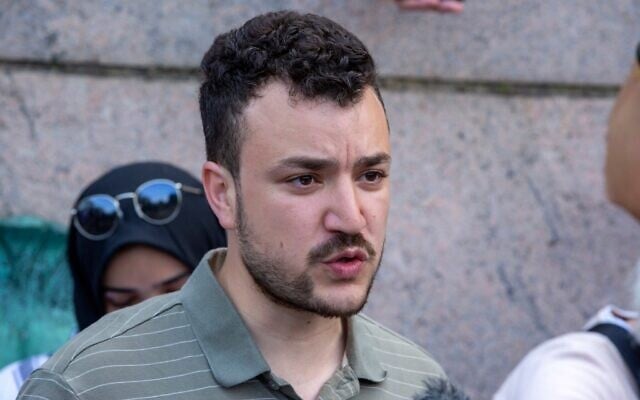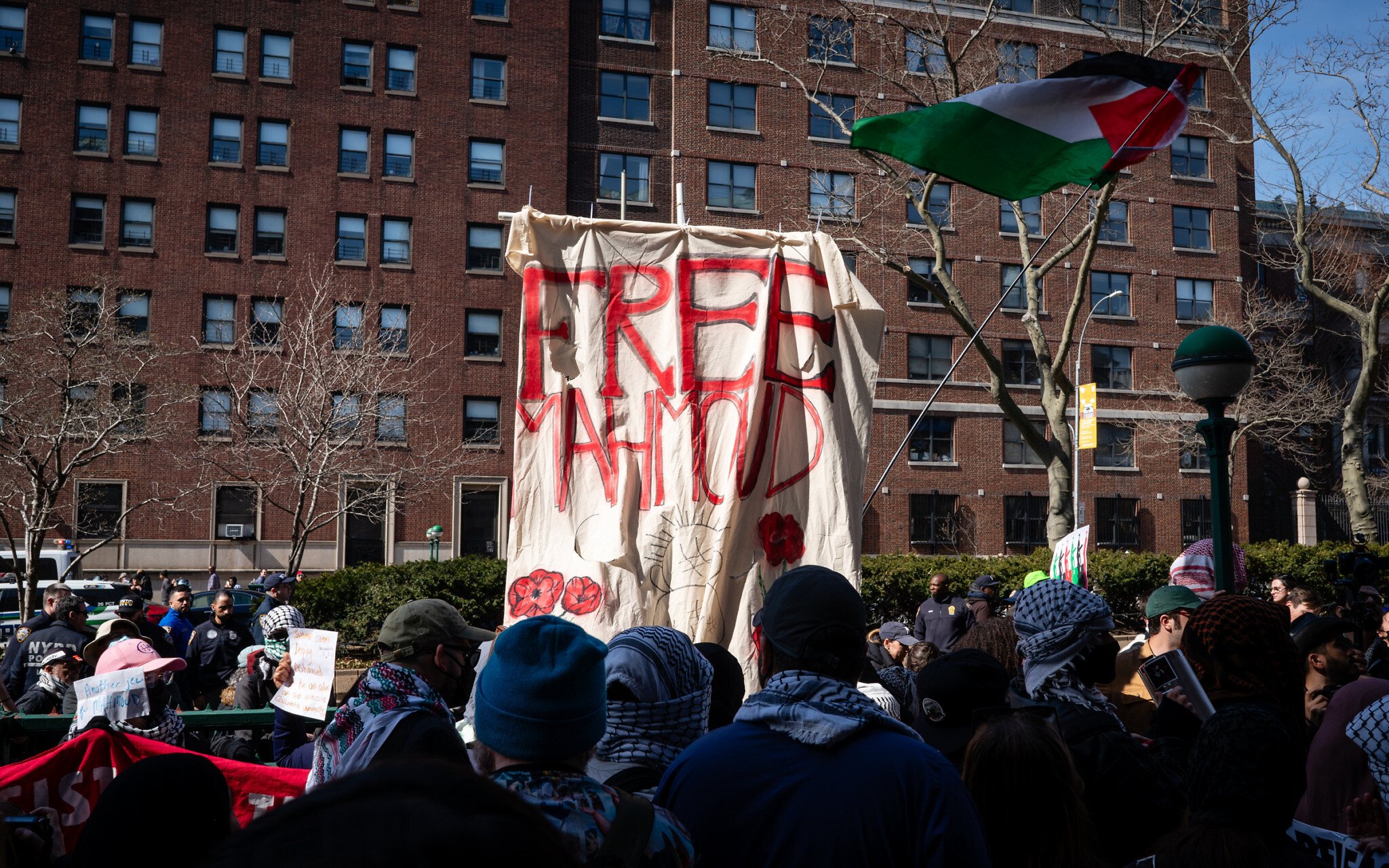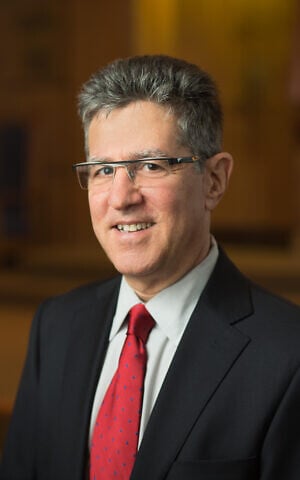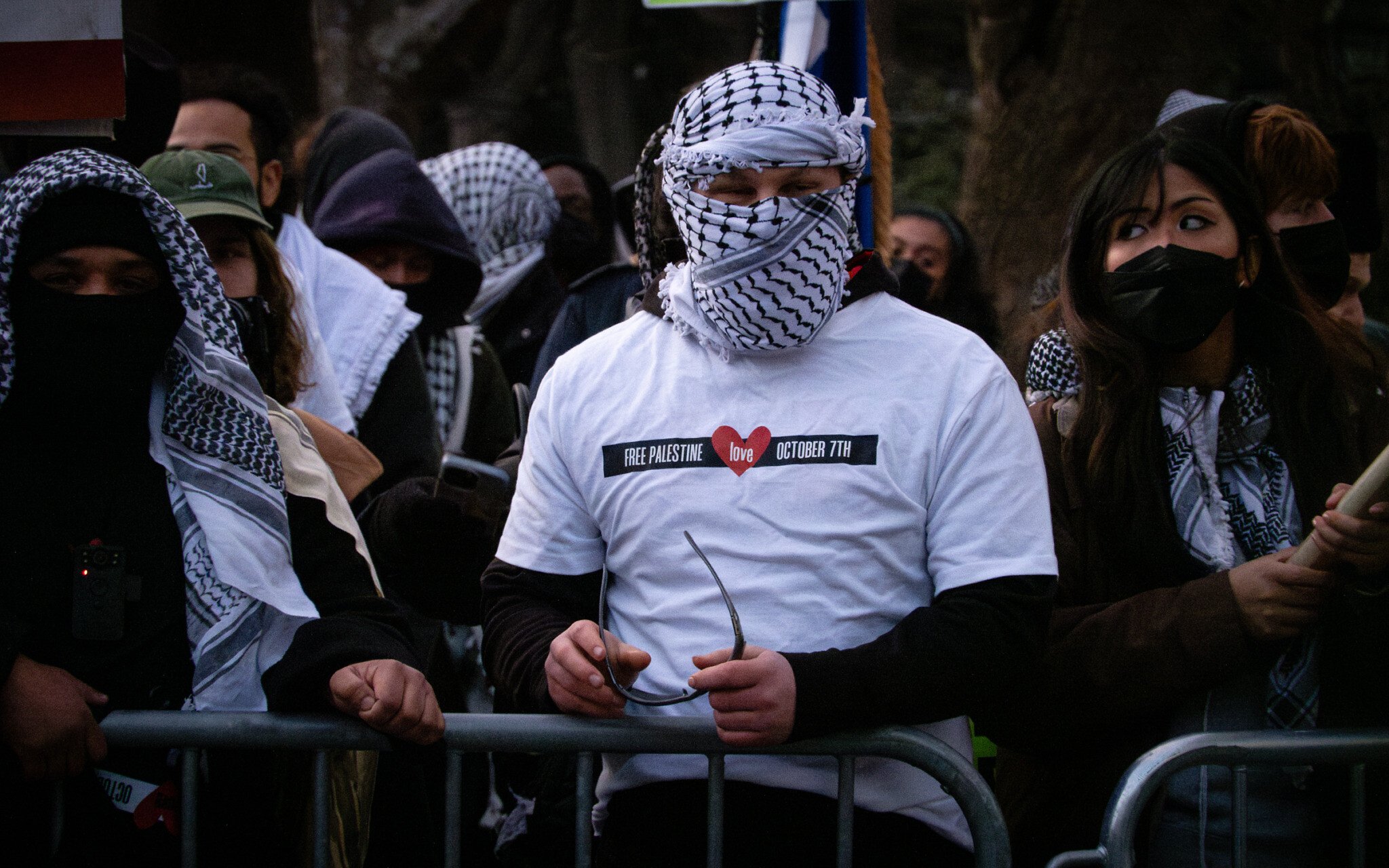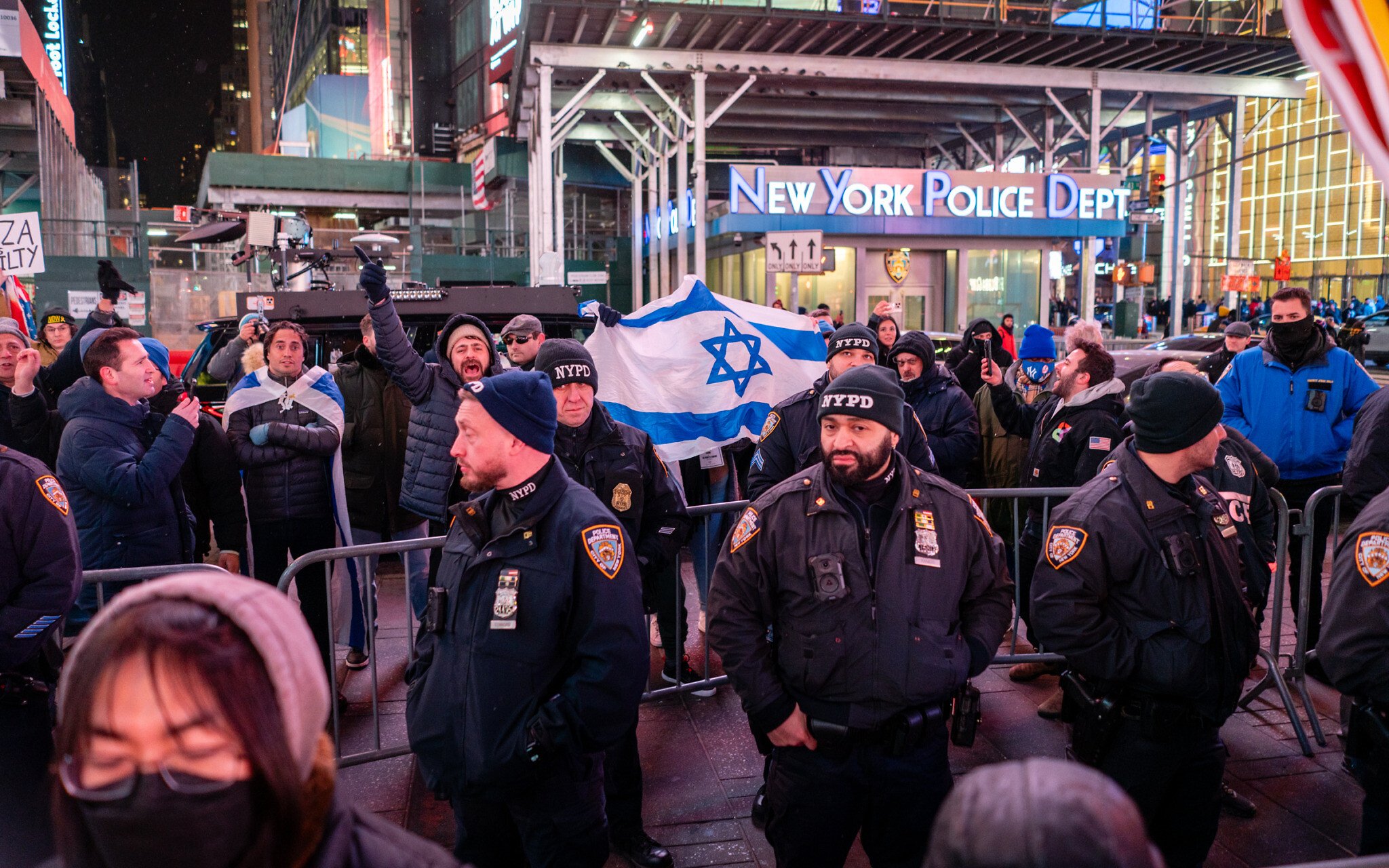


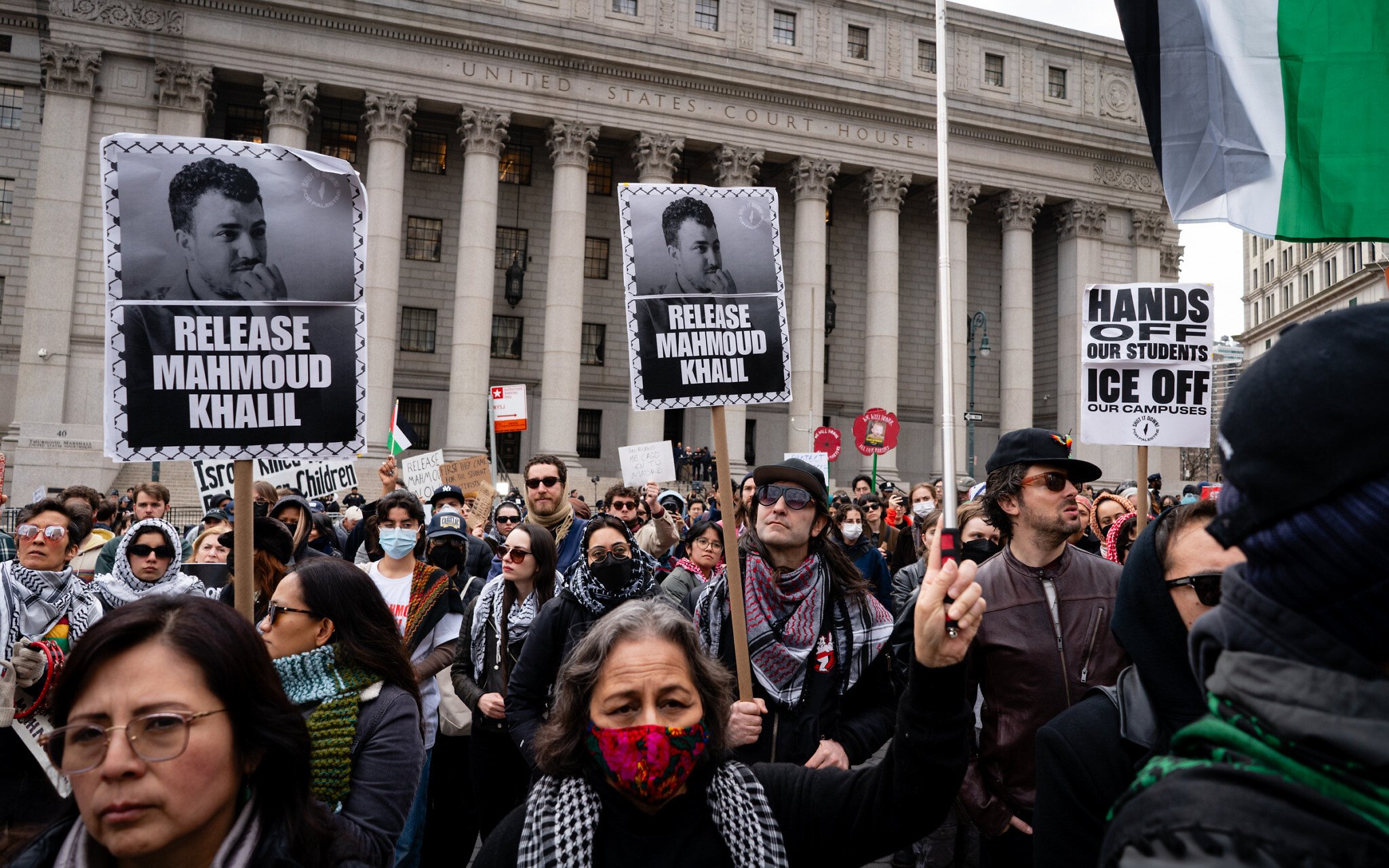
NEW YORK — Robert Remes, a retired immigration lawyer, was expecting the Trump administration to crack down on migrants after the election. He was still surprised by the circumstances surrounding the detention of Columbia University anti-Israel activist Mahmoud Khalil last month.
“The fact that such a person could be picked up goes against everything that immigration lawyers know to be true,” said Remes, who is Jewish and lives in Washington, DC. “That was one of the first indications that these people were really out of control.”
Remes is one of a swath of Jewish Americans who are concerned about the Trump administration’s deportations and visa revocations, even though the effort is being done in the name of fighting antisemitism. Jewish community members, leaders and historians said the lack of transparency and due process related to the crackdown posed a threat to Jews as a vulnerable minority in the United States, especially due to Jews’ history of persecution.
The deportations started when Immigration and Customs Enforcement (ICE) agents detained Khalil, a green card holder and protest leader, outside his apartment last month, shortly after his protest group distributed Hamas material at a demonstration he attended on campus. The arrest set off furious backlash and protests outside a US district court in New York City. Khalil’s case is subject to an ongoing legal battle, with rights groups claiming his detention is unconstitutional. The debates hinge on immigration rights and free speech protections.
The crackdown has continued apace. This week, the Trump administration canceled the visas of students across the University of California school system. On Tuesday, New York University said in a campus-wide email that some community members had been affected.
The process and reasoning for the deportations have, in many instances, been opaque. Nearly 300 students have had their visas revoked, many with scant evidence against them. In one incident that Jewish community members described as especially worrying, a Turkish student at Tufts University, Rumeysa Ozturk, was apprehended by ICE agents after leaving her home to attend a Ramadan iftar dinner. Video of her arrest showed a man in a hoodie approach her on a street, grab her wrists and cuff her hands behind her back. The man and other plainclothes individuals then escorted her to an unmarked vehicle.
The US Department of Homeland Security said she had “engaged in activities in support of Hamas,” without specifying those activities. Her arrest came a year after Ozturk co-authored an opinion piece in the school’s student paper, the Tufts Daily, that criticized the university’s response to calls by students to divest from companies with ties to Israel and to “acknowledge the Palestinian genocide.” Tufts University’s pro-Israel student group came out against her detention, calling the arrest “plain wrong.”
“That’s pretty frightening, to have masked people come and grab you off the street,” Remes said, adding that the deportation of immigrants from El Salvador was, for him, also particularly upsetting. Remes grew up in the Jewish community in the New York suburbs and practiced immigration law for 47 years until he retired last April. He now serves on the board of a Virginia nonprofit that helps immigrant youths attend college.
Some Jewish community members took a nuanced view of the policies, saying they were supportive of much-needed measures to combat antisemitism, and opposed to protesters’ rhetoric, but concerned about the perceived lack of due process afforded to the administration’s targets.
Khalil, for example, has not been charged with a crime. The US alleges Khalil’s presence or activities in the country would have serious foreign policy consequences and that he withheld that he worked for the United Nations Palestinian relief agency, UNRWA, in his visa application.
US immigration law bars non-citizens from espousing support for terrorist groups. Khalil’s protest group also backed violence against “Zionists,” called for the “eradication of Western civilization,” took over buildings on campus, clashed with police and caused extensive property damage.
The Anti-Defamation League issued early praise for Khalil’s detention, while urging an adherence to due process. The group’s CEO, Jonathan Greenblatt, later warned of a “disturbing pattern” of opaque enforcement as the crackdown progressed. Hillel International CEO Adam Lehman also said the group was concerned. The Biden administration envoy for antisemitism, Deborah Lipstadt, has said she is torn over the Trump administration policies.
After Khalil’s arrest, the White House celebrated, writing “SHALOM MAHMOUD” on social media. US President Donald Trump vowed further arrests of those “engaged in pro-terrorist, anti-Semitic, anti-American activity.”
Leaders of the Reform movement, the largest US Jewish denomination, sought to balance concerns about antisemitism with fears related to the rule of law.
“I think Jews need to keep two central principles in mind at all times. Number one, antisemitism is a virus that can kill society. It’s dangerous not only to Jews but to the host community,” said Rabbi Ammiel Hirsch of the Stephen Wise Free Synagogue in New York, a leading pro-Israel voice in the Reform community. “At the same time, among the foundational principles of America, one of the things that makes America exceptional is that we don’t simply grab people off the street.”
Rabbi Jonah Pesner, director of the Religious Action Center of Reform Judaism and senior vice president of the Union for Reform Judaism, echoed that sentiment.
US Jews “are deeply concerned about the antisemitic threat that is real, and the democratic institutions that will protect us,” he said.
Both community leaders drew on their family history to illustrate their concerns. Hirsch said his grandfather was taken from his apartment in Stalinist Russia and never seen again. Pesner said his grandmother, Fannie, escaped Russia for the US to live in a land that upheld “the civil rights protections of all people.”
“This was the historical experience of many Jews who were persecuted and ended up fleeing, arriving here or in Israel. So the idea that somebody could be grabbed off the street without adequate legal foundation and without receiving due process should be frightening to everybody, especially Jews,” Hirsch said, adding that he supported some government measures pressuring universities to protect Jewish students.
“The rule of law protects all of us,” he said. “The ironclad law of Jewish history is that it comes back to the Jewish community.”
Hirsch said he was hearing from congregants “all the time” about the issue. Many members of his community are looking to obtain foreign passports for the option of a haven abroad, due to both antisemitism and the perceived erosion of liberal institutions and the rule of law.
Columbia’s campus has also been divided on the issue. After Kahlil’s detention, some Jewish community members backed the arrest as part of a long-needed response to campus antisemitism, while around 50 Jewish students protested on campus, urging the university to come to Khalil’s defense.
“What I see happening is a Trump administration weaponizing Jewish concerns about antisemitism to enact what is quite simply a fascist agenda,” said Aharon Dardik, a leftist American-Israeli undergrad who helped organize the rally. “That, obviously, does not make Jews any safer. We know how this plays out.”
Not all Jewish communities are conflicted over the Trump administration crackdown. On the right, groups like the Republican Jewish Coalition have been broadly supportive. On the left, groups critical of Israel like IfNotNow have unequivocally opposed the deportations from the start. Right-wing Jews who voted for Trump cited his support for deportations as a reason for their vote, although most US Jews supported Kamala Harris.
Morton Klein, the head of the Zionist Organization of America, said he supported legal immigration and non-citizens needed to be granted due process, but he had no qualms about non-citizens being deported for terror support.
“If you’re not a citizen, you support murdering every Jew, you support Hamas-Nazis and praise October 7, I certainly am not happy to have them in my country. I’m certainly comfortable to remove non-citizens who chant those chants,” he said.
Klein was born to Holocaust survivors in a displaced persons camp in post-war Germany and immigrated to the US at age 4. For him, that history was a reason to support deportations.
“I lost most of my family because of the Holocaust, because of people screaming for the murder of every Jew. I don’t want non-citizens who call for the murder of every Jew to remain in this country,” he said. Non-citizens supporting Hamas “endanger my life and my family,” he added.
Klein did not express unreserved support for all of the deportations. He was not closely familiar with Ozturk’s case, but said that writing a nonviolent op-ed “should not be enough to remove a person from the country, unless they lied on their visa application.”
It was unclear where the majority of US Jews stand on the issue. Ira Sheskin, a professor at Florida’s University of Miami who studies Jewish community demographics, said he was not aware of any polling about US Jewry’s stance toward the crackdown.
Lila Berman, a professor of American Jewish history at New York University, said the deportations “strike a nerve.” Much of the Jewish historical experience in pre-World War II Europe was about “people who thought they had legal status in a country being stripped of that legal status” and then being deported or deprived of due process, she said.
“Without those kinds of rights, the pathway toward political annihilation and then just annihilation was unfortunately so perilously clear,” said Berman, who is working on a book about American Jewish citizenship.
Berman said that after Adolf Hitler took power in 1933, one of his first acts was to strip people who thought they had the right to live in Germany of that right. She resisited drawing parallels between Nazi Germany and the US due to the vast contextual differences, but said Nazi persecution had established the importance of protecting individuals’ legal rights.
“Witnessing a government, our government, treating people who have legally protected status to be here as if they don’t, it’s just so eerie,” she said. “To me, it’s not about the parallel, it’s the principle.”
Jews in the US have been subject to high-profile citizenship battles in the past, in both politically motivated deportations and court battles that expanded citizenship rights. In some of those cases, authorities adhered to due process to carry out political aims.
Emma Goldman, a Jewish anarchist and social activist, moved to New York and married a Jewish immigrant citizen in 1887 but soon divorced. She was arrested repeatedly for her activism, and after she organized resistance to the World War I draft, was imprisoned for two years. Weeks after her release, she was arrested again as an “enemy alien.” Goldman held that she was a citizen because of her short-lived marriage, but the government said she had relinquished her citizenship with her divorce. She was deported to Russia in 1919.
“The American government clearly had the intention of getting rid of her,” Berman said. “Even in that case, and that’s a textbook case of deportation, it’s notable how scrupulous they tried to be about due process.”
In another prominent case, naturalized US citizen Beys Afroyim moved to Israel in 1950 and voted in an Israeli election. When he returned to the US in 1960, the State Department attempted to revoke his citizenship under a law that mandated the loss of citizenship for measures including voting in a foreign election. Afroyim challenged the ruling as unconstitutional in a case that landed in the Supreme Court. The court ruled in Afroyim’s favor in a 5-4 decision in 1967. The decision held that US citizens could not have their citizenship involuntarily stripped, reinforcing the rights of dual citizenship in the US.
Berman said most US Jews have assumed that once granted citizenship, it was “a done deal,” and they were secure, but in reality, citizenship is a “legal construct that has a lot of give to it.” Citizenship laws, and their legal interpretations and applications, are constantly shifting, including in the US, she said.
“A particular government can come in and upend many of the things that we thought were certain about how citizenship and legal protections work,” she said. “I think for Jews, the experience of WWII, seeing how quickly the disregard for citizenship and legal protections, how quickly that can turn people into credible enemies of the state, it’s just very chilling.”
In an irony, Remes’s family history in Nazi Germany could provide his family a haven abroad. His late mother-in-law had her citizenship stripped in Germany because she was Jewish and came to the US as a refugee. Remes’s wife acquired a German passport under laws that allow descendants of German Jews persecuted in the Nazi era to obtain citizenship. The couple is considering using the passport to move to Europe if the US deteriorates further, he said.
“I can really imagine things becoming so horrible that staying here is unacceptable. Who would have ever thought that I or anyone else would say things like that?” he said.

